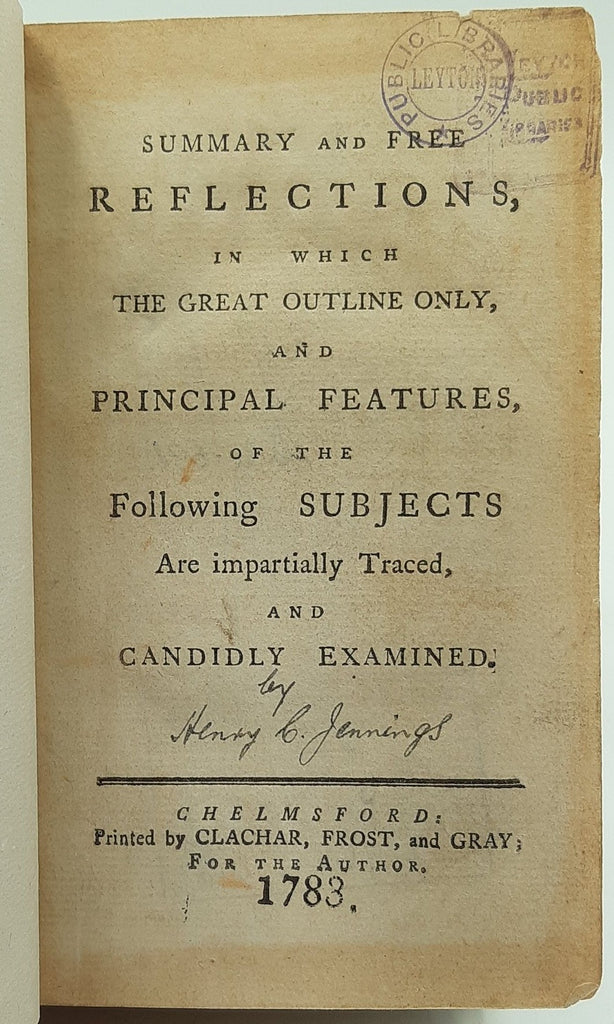Summary and free reflections, in which the great outline only, and principal features, of the following subjects are impartially traced, and candidly examined
[JENNINGS, Henry Constantine]





Chelmsford: Clachar, Frost, and Gray. 1783 [but 1788].
Small 8vo. 153x95mm. pp. xvii [i], 115 [1]; Part X, An endeavour to prove that reason is alone sufficient to the firm establishment of religion [1785]: 31 [1]; An Appendix to the Tenth Part: 64; A Physical Enquiry into the Powers and Properties of Spirit..., 1787, vi, 82; A Postscript to the Physical Enquiry..., 1787; 6, [4], 7-34; Part XI and XII: [141] -178; A Free Enquiry into the Enormous Increase of Attornies..., 1785 iv, 68. Modern half calf, marbled paper covered boards, original red roan label on spine, lettered in gilt. Ex-library (Leyton Public Library) with a few old ink stamps and some underlinings in blue pencil. Some slight foxing and browning in places but overall a very good copy of a eccentric and eclectic set of essays by an even more eccentric figure.
Given the confusing pagination, some bibliographical help might be required. The book is in the twelve parts set out in the table of contents. The first 115 pages are parts I-IX. There then follows Part X with a separate title page dated 1785 which has replaced the original part X from the 1783 edition (thus explaining the absence of pp 117-140) and which is given a separate number in ESTC (T110738). The appendix to part X follows although the addition four page A form of daily prayer for the professors of rational theism dated 1788 is not present. Parts XI and XII of the main work are then bound in after two additional works not mentioned in the contents but which, according to ESTC (T110739 and T110740), were possibly intended to be published with the "Summary". The final work also has a separate ESTC number (T110742). Trust that is clear.
Henry Jennings was what might, charitably, be called a "character". He is best known now as a collector although, despite a few wise purchases not least a marble dog judged by Horace Walpole to be the one of the best animal statues in classical art, he might, he seems to have been more of a hoarder. He was often in and out of the debtors' prison, lived in squalor and ate modestly, regarding "a feast [as] the conversion of gold into excrement", and alone, accompanied only by a bronze bust of a Roman goddess. Unsurprisingly, his mind was well-stocked and full of opinions, as is clear from this wide ranging and somewhat bizarre collection, all parts of which are rare, none showing more than eight copies on ESTC.
Small 8vo. 153x95mm. pp. xvii [i], 115 [1]; Part X, An endeavour to prove that reason is alone sufficient to the firm establishment of religion [1785]: 31 [1]; An Appendix to the Tenth Part: 64; A Physical Enquiry into the Powers and Properties of Spirit..., 1787, vi, 82; A Postscript to the Physical Enquiry..., 1787; 6, [4], 7-34; Part XI and XII: [141] -178; A Free Enquiry into the Enormous Increase of Attornies..., 1785 iv, 68. Modern half calf, marbled paper covered boards, original red roan label on spine, lettered in gilt. Ex-library (Leyton Public Library) with a few old ink stamps and some underlinings in blue pencil. Some slight foxing and browning in places but overall a very good copy of a eccentric and eclectic set of essays by an even more eccentric figure.
Given the confusing pagination, some bibliographical help might be required. The book is in the twelve parts set out in the table of contents. The first 115 pages are parts I-IX. There then follows Part X with a separate title page dated 1785 which has replaced the original part X from the 1783 edition (thus explaining the absence of pp 117-140) and which is given a separate number in ESTC (T110738). The appendix to part X follows although the addition four page A form of daily prayer for the professors of rational theism dated 1788 is not present. Parts XI and XII of the main work are then bound in after two additional works not mentioned in the contents but which, according to ESTC (T110739 and T110740), were possibly intended to be published with the "Summary". The final work also has a separate ESTC number (T110742). Trust that is clear.
Henry Jennings was what might, charitably, be called a "character". He is best known now as a collector although, despite a few wise purchases not least a marble dog judged by Horace Walpole to be the one of the best animal statues in classical art, he might, he seems to have been more of a hoarder. He was often in and out of the debtors' prison, lived in squalor and ate modestly, regarding "a feast [as] the conversion of gold into excrement", and alone, accompanied only by a bronze bust of a Roman goddess. Unsurprisingly, his mind was well-stocked and full of opinions, as is clear from this wide ranging and somewhat bizarre collection, all parts of which are rare, none showing more than eight copies on ESTC.
